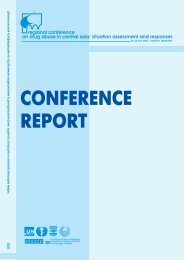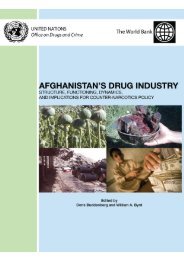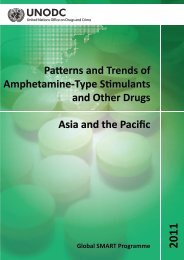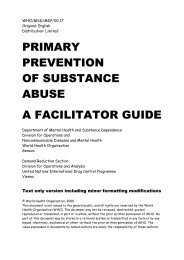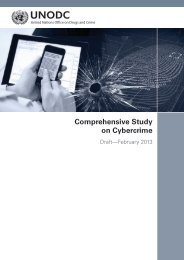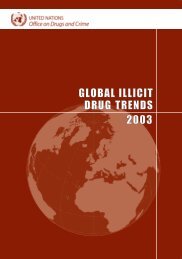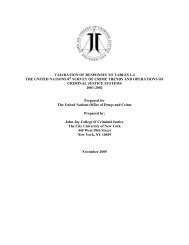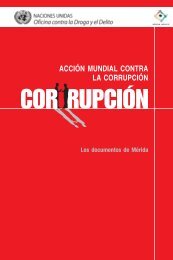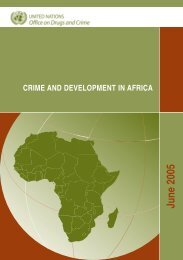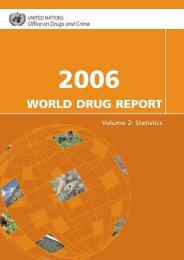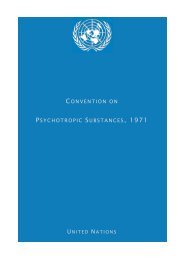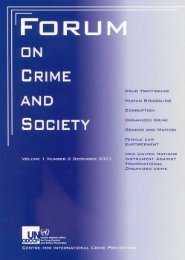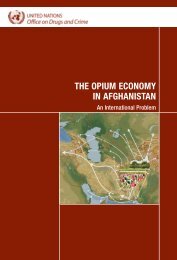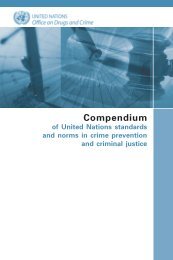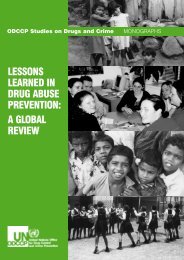Manual for Training Police on Anti Human Trafficking
Manual for Training Police on Anti Human Trafficking
Manual for Training Police on Anti Human Trafficking
You also want an ePaper? Increase the reach of your titles
YUMPU automatically turns print PDFs into web optimized ePapers that Google loves.
<str<strong>on</strong>g>Manual</str<strong>on</strong>g> <str<strong>on</strong>g>for</str<strong>on</strong>g> <str<strong>on</strong>g>Training</str<strong>on</strong>g> <str<strong>on</strong>g>Police</str<strong>on</strong>g> <strong>on</strong> <strong>Anti</strong> <strong>Human</strong> <strong>Trafficking</strong> 74<br />
Deciding <strong>on</strong> the c<strong>on</strong>tent of the sessi<strong>on</strong>s is the most significant part of the planning <str<strong>on</strong>g>for</str<strong>on</strong>g> training.<br />
Following sources of in<str<strong>on</strong>g>for</str<strong>on</strong>g>mati<strong>on</strong> can be used to finalize the inputs of a specific training sessi<strong>on</strong>:<br />
Learning needs analysis findings<br />
Review and evaluati<strong>on</strong> reports relating to AHT issues in the c<strong>on</strong>text of the organizati<strong>on</strong> and its work<br />
Sex disaggregated data relating to the organizati<strong>on</strong> and its work<br />
AHT research relevant to the participants’ area of work<br />
Internati<strong>on</strong>al, nati<strong>on</strong>al, sectoral and/or organizati<strong>on</strong>al AHT policies relevant to the organizati<strong>on</strong>’s<br />
work<br />
Planning/policy documents produced by the organizati<strong>on</strong> and/or by course participants<br />
Evaluati<strong>on</strong> reports of past training courses<br />
Others<br />
The participants will be practicing police pers<strong>on</strong>nel who are all adults. It will there<str<strong>on</strong>g>for</str<strong>on</strong>g>e be helpful to<br />
keep the following in mind while designing the sessi<strong>on</strong>s and also during the actual training sessi<strong>on</strong>s.<br />
Principles of Adult Learning<br />
Please bear in mind that adults have different resp<strong>on</strong>ses to training as compared to children. Adult<br />
learners may show the following characteristics:<br />
Adult learners enter into a learning situati<strong>on</strong> with anxiety and fear that they will make fools of<br />
themselves; they are more likely to be inhibited and hesitant to act or speak, whereas with<br />
children it is usually vice versa.<br />
They believe that learning new skills/adopting new attitudes are <str<strong>on</strong>g>for</str<strong>on</strong>g> children and that they are<br />
already mature/developed.<br />
Adults have pre-determined ideas and may present extreme resistance to change as they are more<br />
‘set in their ways’.<br />
Adult learners need an envir<strong>on</strong>ment free of ridicule and an atmosphere of mutual and c<strong>on</strong>structive<br />
criticism.<br />
When seen in the c<strong>on</strong>text of training <strong>on</strong> anti-human trafficking, you must remember that participants<br />
might exhibit:<br />
- Anxiety and fear at being judged <str<strong>on</strong>g>for</str<strong>on</strong>g> not being aware about the issue of human trafficking - You<br />
must assuage this fear by highlighting the serious nature of the issue and how relevant the role of<br />
the police becomes. So, this will act as a catalyst in bringing about a sense of urgency to learn new<br />
things and apply the same.<br />
- A noti<strong>on</strong> of feeling too old/mature to be learning anything new, even if it is about a current issue<br />
like trafficking – remind them that learning is a life-l<strong>on</strong>g process which does not stop at a certain<br />
age, or with a certain maturity.<br />
- Resistance to change their mindsets – The mindset that trafficking and prostituti<strong>on</strong> are <strong>on</strong>e and<br />
the same aspect is a prevalent but misguided view. Since many of the participants will have<br />
‘learned’ that through mainstream/patriarchal society/socializati<strong>on</strong>, it is your duty, as the facilitator,<br />
to undo such learning. You must be able to persuade them through relevant illustrati<strong>on</strong>s how<br />
damaging such resistance can prove <str<strong>on</strong>g>for</str<strong>on</strong>g> a victim/survivor who c<strong>on</strong>siders the police officer as her/<br />
his sole source of support. As such, it is crucial to police interventi<strong>on</strong>s that the belief that<br />
prostituti<strong>on</strong> and trafficking are syn<strong>on</strong>ymous is ‘unlearned’. You must impress up<strong>on</strong> the participant<br />
that they are to represent the delivery of justice to the victim/survivors of trafficking.<br />
- Feelings of inferiority and disdain that hold back their learning - You must be able to c<strong>on</strong>vey your<br />
points in a most n<strong>on</strong>-threatening, n<strong>on</strong>-demeaning manner, with no element of ridicule or superiority<br />
towards the participants.<br />
- Resistance to ‘Outsiders’ – For example, participants may show some resistance, hesitati<strong>on</strong>, or even<br />
oppositi<strong>on</strong> towards other participants who are not police. An NGO trainer in a police training<br />
college, <str<strong>on</strong>g>for</str<strong>on</strong>g> instance, may be regarded and treated as an ‘outsider’.



